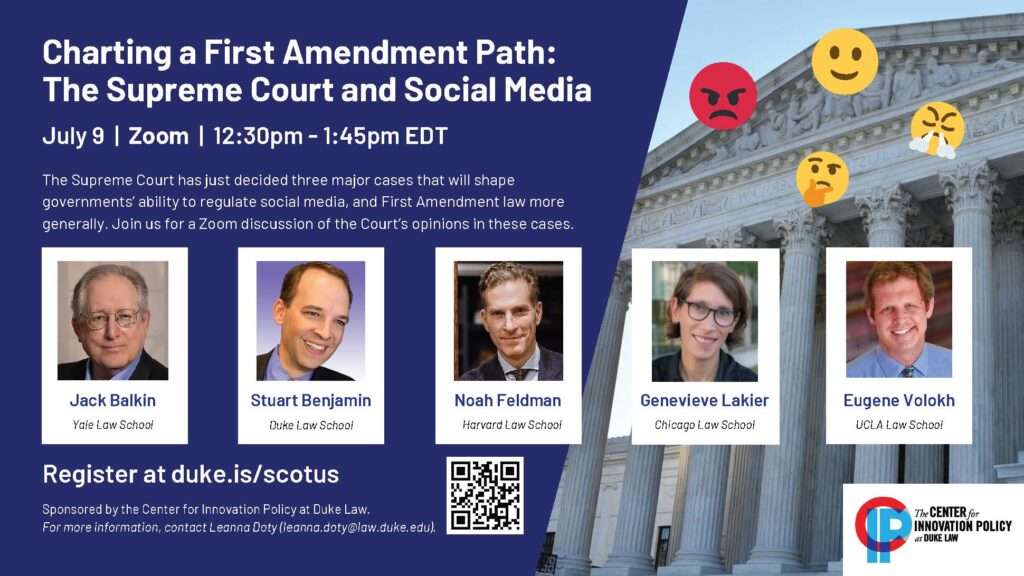The Volokh Conspiracy
Mostly law professors | Sometimes contrarian | Often libertarian | Always independent
The Supreme Court's Reasoning Prohibits the Deplatforming Limits that the Parties Care About
As the Moody v. NetChoice majority noted, the parties focused on Facebook's and YouTube's main feeds. The majority similarly focused on those main feeds in its extensive discussion of First Amendment principles, and, as co-blogger Ilya notes, it left little doubt about the unconstitutionality of the Texas and Florida statutes as applied to them. NetChoice didn't invalidate the laws on their face because of uncertainty about how the statutes apply to other services that were barely discussed (if at all) in the briefing below.
The article that co-blogger Eugene links to in his 12:19pm post today made probably the strongest argument in favor of the Texas and Florida laws at issue in NetChoice (and both states' lawyers cited Eugene's article in their oral arguments): that platforms can be treated like common carriers such that the regulation of the hosting of users does not implicate the First Amendment. The Alito opinion (concurring in the decision to remand but rejecting the majority's application of the First Amendment to the statutes as issue) largely agreed with Eugene's reasoning, but the majority did not.
Eugene says that "the majority did not decide whether the First Amendment extends to platforms' many other functions—such as platforms' decisions whether to 'deplatform' users in a way that keeps readers from seeing the user's posts even when they deliberately seek out those posts," and I think that's correct for platforms other than the curated ones like Facebook's and YouTube's main feeds. I could easily imagine that the Court might find that some platform like Gmail cannot deplatform anyone based on their viewpoint, on the theory that Gmail does not engage in expression for First Amendment purposes. But Texas and Florida did not enact these statutes to quash Gmail's exclusion of users based on their viewpoint.
Is there any argument that under NetChoice regulating the exclusion (i.e., deplatforming) of users from the kinds of main feeds that the majority focused on does not implicate the First Amendment? I don't think so. The passages that Ilya quotes (and many other passages like it in the opinion) are very clear about the application of the First Amendment to these platforms. Beyond that, the logic of applying the First Amendment to the exclusion of messages (which the majority clearly does) also applies to the exclusion of users. A platform can exclude pro-KKK messages as part of its own communication that it abhors those messages. Similarly, excluding the KKK as a group, or the Grand Wizard of the KKK as a person, such that their posts cannot be seen by other users, would communicate that it wants nothing to do with the KKK. As the majority stated,
Suppose, for example, that the newspaper in Tornillo had granted a right of reply to all but one candidate. It would have made no difference; the Florida [right-of-reply] statute still could not have altered the paper's policy.
As the majority noted, the platforms rely on algorithms to implement their exclusion standards. A decision to implement an algorithm excluding all messages relating to the KKK (or the Kentucky Derby) would be covered by the First Amendment. And if one of the ways they chose to implement that exclusion was to exclude all messages from the Grand Wizard of the KKK, or the Kentucky Derby organization, they are still making an editorial decision that constitutes speech for First Amendment purposes. We might object that their decision excludes more speech than we would like (what's wrong with the Kentucky Derby?), just as we might object to the decisions made by the parade organizers in Hurley or the newspaper in Tornillo. But that doesn't change the fact that they are communicating by doing so.
Anyway, I'm guessing Eugene and I will discuss this at the upcoming online symposium on these cases. See below to sign up for what passes for fireworks among law professors.



Show Comments (43)